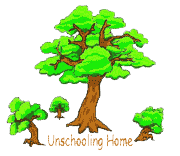"Learning," says Sandra Dodd, "comes from connecting something new to what you've already thought or known."
Charlotte Mason called this understanding of education "the science of relations." Relations, connections, rabbit trails: these are the terms homeschoolers use to describe the natural processes of learning. One topic, even one word, sparks an interest or a memory, and zing, learning happens.
It's like playing with those magnetic rods and balls you stick together to make cool geometric shapes. (You know, the ones currently banished to the top of my closet because they are so fearfully dangerous for babies.) When you touch one of the little rods to one of the shiny silver balls, there's such a satisfying click as they draw together. You can feel the power of the connection.
I dearly love, at the end of a day, to think about all the connections my kids made—or that I made!—that day. So many satisfying little clicks, so many pieces of knowledge fitting together in interesting ways.
I had the Sandra Dodd "connections" page open on the laptop today because I wanted to look up that quote for a post. (This post, I suppose, although, as you'll see, the page took over and became the impetus of the post.) If you scroll down Sandra's page a little, you'll see there's a fun exercise for sparking connections, the bit with all the words in balloons. This caught Jane's eye and she wanted to know what it was about. I showed her, and she asked if we could try it. She decided to start with the word "purple."
We started shouting out ideas or things we associate with purple, and of course "royalty" came up, and neither one of us could remember the name of the shellfish the original purple dye came from. We looked it up and found this page, which told some tidbits I'd never heard before. Did you know the legend says it was actually Hercules's dog who discovered the dye? Hercules noticed its mouth was stained purple after it ate some snails.
King Phoenix received a purple-dyed robe from Herakles and decreed the rulers of Phoenicia should wear this color as a royal symbol.
We also found this part particularly interesting:
The chemical birth of the synthetic dye industry can be traced to the discovery of an aniline-based purple dye, mauveine, by William H. Perkin in 1856, who accomplished this while searching for a cure for malaria. Perkin was an English chemist who changed the world of his time by making this purple color available to the masses. It became quite fashionable to wear clothing dyed with “mauve,” and Mr. Perkin became a very wealthy man.
We had lots of other associations with purple, but the Hercules thing was so interesting we got sidetracked, and about that time Rose asked me to make a baby duck out of felt for Beanie, to match Rose's Beanie Baby duck (!), and in the middle of that endeavor I remembered I'd picked up a book of patterns for knitted animals, and hadn't shown it to Jane yet, and she got all excited and went off to translate the knitting patterns into crochet patterns, because she much prefers crocheting.
Rose asked for a felt dog next, or maybe Jane will crochet her one, but I don't think we'll stain its mouth purple.

